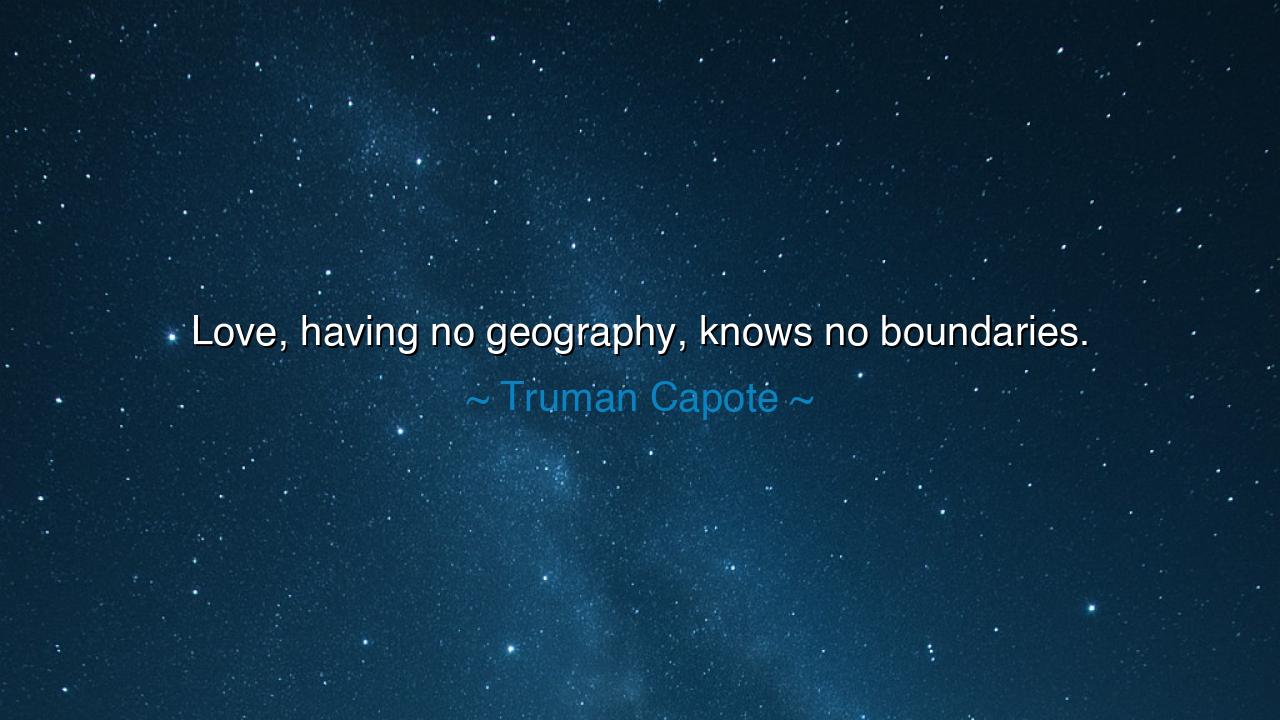
Love, having no geography, knows no boundaries.






Truman Capote, in his timeless wisdom, tells us: “Love, having no geography, knows no boundaries.” These words speak to the universal and limitless nature of love. In a world often divided by borders, cultures, and differences, love transcends these human-made separations. True love does not recognize the constraints of location, whether physical or emotional. It is a force that moves freely across nations, languages, and hearts, a bridge between peoples, a connection that binds us regardless of where we come from or where we go. Love is not confined by geography or circumstance; it is a universal, ever-present force that unites us all.
In the wisdom of the ancients, love was seen as a divine force that connects the heavens to the earth. The Greek philosophers often spoke of eros, agape, and philia—different forms of love that connected people to each other, to truth, and to the divine. Plato, in his dialogues, considered love to be a force that transcended the individual, leading the soul towards a higher truth and beauty. The highest form of love, he believed, was a love that was not bound by mere physical attraction or self-interest, but by a universal connection that reached beyond the confines of geography or time. Love, in this sense, was eternal, a force that knew no boundaries.
The story of Antigone, the daughter of Oedipus, offers an example of love that knows no boundaries. Antigone, in her love for her brother Polynices, defied the law of the land to give him a proper burial, despite the edict of King Creon, her uncle. Her love for her family and for what was right pushed her to act against the authority of the state, showing that true love cannot be constrained by political boundaries or societal norms. Antigone’s love was a love that transcended the borders of law, loyalty, and family, leading her to sacrifice herself for the cause of justice and the honor of her brother. Her story reveals that love’s power lies not in the limits placed upon it but in its willingness to break free from them to fulfill a higher calling.
In the more modern world, we can see Capote’s wisdom reflected in the story of Nelson Mandela, whose love for his people and for justice knew no boundaries. Mandela’s love for his country and his fellow South Africans did not cease when he was imprisoned for over two decades. Even behind the bars of a prison cell, Mandela’s love for his people burned bright. His love was not restricted by the geography of his imprisonment, nor by the hatred and division sown by apartheid. His love for freedom and equality led him to fight tirelessly, both in prison and after his release, to unite a nation and end the divisive regime that sought to separate people by race. Mandela’s love became a unifying force, not bound by borders or hate, but one that sought to build bridges and heal divisions.
Capote’s statement also speaks to the personal nature of love. Love is not a commodity or a possession; it is not confined to a certain place or time. Love, in its deepest sense, flows freely across the boundaries of distance, time, and even life. Consider the love that mothers have for their children, a love that knows no limits. A mother’s love for her child is not bound by geography; it is a love that endures regardless of where the child may be or how far apart they are. A mother will love her child across oceans and years, and this love will never diminish, for it transcends all physical constraints. This deep, unwavering love is not limited by the circumstances of space or time but remains ever-present, like a force that connects the past, present, and future.
The lesson here, O children of the earth, is clear: love has no boundaries. It is a force that transcends everything that seeks to divide us—whether it be race, nationality, social status, or circumstances. When we truly love, we see beyond the borders that separate us. Love is universal, and in embracing this truth, we are called to break down the barriers between us, to reach out and connect with one another in ways that defy the walls we so often build between ourselves. Love, when it is pure, is not limited to any one person, place, or situation; it is limitless, and its power lies in its ability to unite all people, regardless of differences.
So, let your love be as boundless as the sky above you. Embrace love’s universal nature, and let it guide you to break down boundaries in your own life. Love those around you, regardless of their background, their status, or their differences. In loving without boundaries, you will find that you are connected to all things, that the divisions between nations and peoples become irrelevant, and that love becomes the greatest force for unity and peace. Remember, as Capote said, love knows no boundaries—and in this love, we find the essence of what it means to be truly human.






AAdministratorAdministrator
Welcome, honored guests. Please leave a comment, we will respond soon